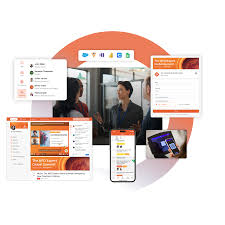The Power of Online Virtual Event Platforms
In today’s digital age, online virtual event platforms have revolutionized the way events are hosted and attended. These platforms offer a wide range of features and benefits that make hosting and participating in virtual events seamless and engaging.
One of the key advantages of online virtual event platforms is their accessibility. Attendees can join events from anywhere in the world, eliminating the need for travel and accommodation expenses. This opens up opportunities for increased participation and engagement from a global audience.
Virtual event platforms also offer interactive features such as live chat, Q&A sessions, polls, and networking opportunities. These features help create a more engaging and immersive experience for attendees, leading to higher levels of participation and interaction.
Furthermore, online virtual event platforms provide valuable data and analytics that organizers can use to measure the success of their events. From attendee engagement metrics to lead generation insights, these platforms offer valuable insights that can be used to improve future events.
Whether hosting a conference, trade show, webinar, or networking event, online virtual event platforms offer a flexible and scalable solution for organizations looking to connect with their audience in a digital environment.
Embrace the power of online virtual event platforms today and unlock new possibilities for hosting successful and engaging events!
6 Essential Tips for Maximizing Your Online Virtual Event Platform
- Choose a user-friendly platform that offers interactive features.
- Promote the event through various online channels to reach a wider audience.
- Provide clear instructions and technical support for attendees to navigate the platform.
- Engage participants with live polls, Q&A sessions, and networking opportunities.
- Test the platform in advance to ensure smooth running of the event.
- Collect feedback from attendees to improve future virtual events.
Choose a user-friendly platform that offers interactive features.
When selecting an online virtual event platform, it is crucial to opt for a user-friendly option that provides interactive features. A platform that is intuitive and easy to navigate ensures a seamless experience for both organizers and attendees. Interactive features such as live chat, Q&A sessions, polls, and networking opportunities enhance engagement and foster meaningful interactions among participants. By choosing a user-friendly platform with interactive elements, you can create a more engaging and immersive virtual event that leaves a lasting impact on your audience.
Promote the event through various online channels to reach a wider audience.
To maximize the impact of your online virtual event, it is crucial to promote it through various online channels to reach a wider audience. Utilizing social media platforms, email marketing, website announcements, and online advertising can help increase visibility and attract a diverse range of attendees. By leveraging multiple online channels, you can effectively spread the word about your event and ensure that it reaches a larger audience, ultimately leading to greater engagement and participation.
Provide clear instructions and technical support for attendees to navigate the platform.
To ensure a smooth and successful online virtual event, it is crucial to provide clear instructions and robust technical support for attendees to navigate the platform effectively. Clear and concise guidance on how to access different features, participate in interactive sessions, and troubleshoot common issues can enhance the overall attendee experience. Additionally, offering readily available technical support resources such as FAQs, live chat assistance, or dedicated helplines can help attendees feel supported and confident in engaging with the virtual event platform. By prioritizing clear instructions and reliable technical support, organizers can create a seamless and user-friendly experience for all participants.
Engage participants with live polls, Q&A sessions, and networking opportunities.
To enhance participant engagement during online virtual events, it is crucial to incorporate interactive elements such as live polls, Q&A sessions, and networking opportunities. By utilizing these features, organizers can create a dynamic and immersive experience that encourages active participation and interaction among attendees. Live polls allow for real-time feedback and engagement, while Q&A sessions provide a platform for attendees to ask questions and engage with speakers or presenters. Networking opportunities enable participants to connect with one another, fostering meaningful relationships and collaborations. Overall, incorporating these interactive elements can significantly enhance the overall experience of online virtual events and create a more engaging environment for all participants.
Test the platform in advance to ensure smooth running of the event.
Testing the online virtual event platform in advance is a crucial step to ensure the smooth running of the event. By conducting thorough testing, organizers can identify and address any potential technical issues, ensuring a seamless experience for both hosts and attendees. Testing allows for troubleshooting of audio and video quality, interactive features, and overall platform functionality, helping to mitigate any disruptions during the actual event. Taking the time to test the platform in advance can significantly enhance the success of the virtual event and provide a positive experience for all participants.
Collect feedback from attendees to improve future virtual events.
Collecting feedback from attendees is a crucial step in improving future virtual events. By gathering insights and suggestions from participants, event organizers can gain valuable information on what worked well and areas that need improvement. Feedback allows organizers to tailor future events to better meet the needs and expectations of attendees, leading to increased engagement and satisfaction. Implementing feedback mechanisms demonstrates a commitment to continuous improvement and shows attendees that their opinions are valued, fostering a positive relationship between organizers and participants.

